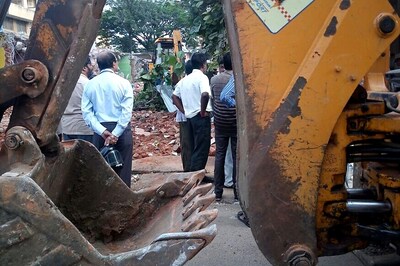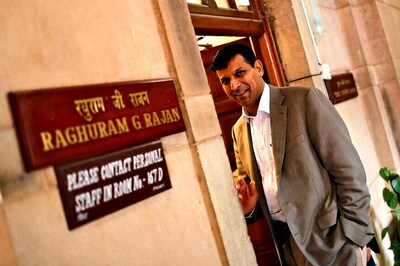
views
Finance Minister Arun Jaitley's third Budget was welcomed by leaders of companies across various sectors for its focus on infratructure, thrust on technology and initiatives in digital literacy. Here are some of the reactions.
Bhavish Aggarwal, Co-founder and CEO, Ola : Focus on skill development will have a domino effect on employment, financial independence and GDP growth. It was quite encouraging to see the Hon'ble FM also address some key road transportation issues and set aside a requisite budget for infrastructure development. Creating inroads for entrepreneurship in the public transportation space and amendments in the Motor Vehicles Act to allow for innovations will provide a strong impetus towards enabling mobility for citizens. These proposed initiatives give us immense confidence as we work towards our mission of building mobility for a billion Indians.
Rana Kapoor, MD & CEO, YES Bank: The Finance Minister has managed to balance the need to prioritize social sector requirements with economic and business imperatives. The segmented 9-Pillar Approach with well carved out deliverables will ensure execution clarity and focus. By adhering to fiscal deficit aim of 3.5% the Budget creates room for complimentary monetary policy rate cut of 50 bps in the near term and 75-100 bps in 2016, conditioned on favorably evolving macros. Key measure to increase the allocation to infrastructure with an impressive outlay of INR 2.2 lakh crore will help to re-energize the growth multiplier, while the specific measures to improve ease of doing business and favorable tax treatment for start-ups and MSMEs will go a long way in boosting job creation.
Anita Rastogi , Partner-Indirect Tax, PwC India: The overall budget from indirect tax perspective aims to incentivize the domestic value addition to boost make in India. It has also introduced few cesses such as Krishi Kalyan Cess 0.5% on all taxable services and levy of infrastructure cess @1% on petrol and 2.5 to 4% on diesel cars. For ease of doing business there is rationalization of Credit Rules, allowing improved credit flow, reducing the compliance burden and associated litigation. There is also a mandate to set up 11 new benches of Tax Tribunal and introduction Dispute Resolution Scheme for indirect taxes.
Dr Prathap C Reddy, Chairman, Apollo Hospitals Group: The government’s aim to double income of farmers in five years; new initiatives to increase irrigation access, and its objective to skill 1-crore youth in the next three years. I commend the Hon’ble Finance Minister for encouraging the National Skill Mission which will play a very significant role in health sector providing multi-skill training and employment both within and outside the country. Healthcare has finally taken center stage in the Budget with initiatives like the Health Protection Scheme of Rs 1 lakh to cover unforeseen illness in poor families with an additional Rs 30,000 for senior citizens. In addition, the government also plans to add 3,000 pharmacies under the Jan Aushadhi Yojana to provide generic drugs at affordable rates.
C Sasidhar, Managing Director Krishnapatnam Port Company Ltd: I mplementation of Indian Customs Single Window Project and initiatives to reduce the cargo release time and the transaction costs of EXIM trade will bring in the required boost in terms of ease of operations while also making the sector more attractive. Also the SAGARMALA project which has already been rolled out was a very welcome move for the port sector and it is now all set to receive a fresh boost with the current budget now planning to develop new greenfield ports both on the eastern and western coasts of the country with a budget allocation of Rs. 800 crore.
Dr. Michael Thiemann, CEO thyssen krupp, India: The plan of ‘Make In India’ can get derailed without adequate supply of top-notch manpower, therefore an allocation of Rs 1,804 has been made towards skill development. It further announced plans to set-up 1500 multi-skill training institutes, and tie-up with industry and academia for the creation of National Board for Skill Development Certification. The initiative to alter customs and excise duty rates on certain inputs to reduce local manufacturing costs and increase competitiveness of domestic industry is definitely a positive move.
Umesh Revankar, MD, Shriram Transport Finance Company Ltd: Not all budgets have to be a populist one and the Honorable Finance Minister’s job is not to make everyone happy, but to allocate the available resources to where it is utmost needed. This is exactly what Mr. Jaitley has done to build the inherent strength of the economy by giving maximum budgetary allocations to agriculture, the infrastructure sector and thereby giving much needed impetus to the rural India story.
Amol Naikawadi, Joint Managing Director, Indus Health Plus : The overall Union Budget 2016 has been welcoming and focused on empowerment on the bottom pyramid of the society from all aspects. Introduction of National Dialysis Service Programme is a good initiative towards the solving the healthcare issues at the district level to reduce the cost of treatment under PPP model. Also, LPG connection for women members of rural homes will help in reducing the disease burden due to Chula smoking. The increase in tax exemption limit was a positive move to encourage people to equip themselves with health insurance. The another great initiative by the government is to provide health insurance of upto Rs. 1 lakh per family; extra of Rs. 30,000 for people above 60 years (senior citizens). However no special emphasis were given to other requirements of the health care sector at large”.
AM Devendranath, Head-Energy vertical, Feedback Consulting: The focus on:a) Key demand sectors such as Agri, Rural demand and the middle class to drive domestic consumption while the exports are not in our control b) At the same time focus on putting in the structural reforms and pushing in large infrastructure spends c) While, maintaining a 3.5 Fiscal deficit, signals a very sharp and serious economic consideration for the country.
George Alexander Muthoot, MD, Muthoot Finance Ltd: The current budget propels on the strong macro environment like rural push, infrastructure development, power and digital India. The government has focused on key social spending like education and healthcare thereby improving the quality of life of lower income group. So in all the budget aims at inclusive growth with its reforms, generate employment and support the bottom of the pyramid entrepreneurs.
BK Soni, Chairman and MD, Eco Recycling Ltd: This is one of the finest budget where the importance is given to circular economy by increasing the power of buying, in hands of the poorest of the poor farmers, other low income group and the increase in the opportunities for the employed and unemployed youth by having an access to the financial and other resources, thereby by creating more thrust will give E-Waste more boost to the industry, environment and employment.
Sanjay Mehta, president, Metal Recycling Association of India (MRAI): The Budget has brought down the customs duty on imports of brass scrap from 5% to 2.5%, which will help the brass scarp users for metal recycling. But the duties on imports of other categories of scrap such as steel scrap, stainless steel scrap, zinc scrap, lead scrap, aluminum scrap, copper scrap have not been reduced. For instance, Indian metal recycling industry imports 100% of its stainless steel scrap requirements and the industry was demanding to reduce the duty from the current rate of 2.5% to nil, which has not been considered. The Metal Recycling Industry could have received a major boost had the duties been rationalized, as these are vital raw material for secondary metal producers and are not available in India in required quantity.
Pramoud Rao, Promoter Managing Director, Zicom Group: The highlight of the budget was its special thrust on agriculture and measures taken to double the income of farmers. in this budget we can see a lot of focus on rural areas. The crop insurance scheme and other allocations shows the government’s tremendous thrust on improving farmers welfare. The linking of rural roads, 100% electrification by 2018 and a lift in farmers income are positive signs. I feel, even if you double the farmers income it would stand less than 20,000. It could have increased more. But whatever that has been announced for rural improvement should be welcome.
Haresh Sippy, MD, TEMA India: We appreciate government’s concern to introduce special patent regime to accelerate and support R&D activities. Government spending of approx 2.21 lakh crore and 2.18 lakh crore on Infrastructure projects and roads and rail projects is in line with governments strong desire to provide for better roads and strong infrastructure in the country. Registration of Company in one day for start-ups will definitely have a positive impact on the ease of doing business ranking and will create a positive sentiment even amongst the foreign institutional investors.
Rajat Gandhi, Founder and CEO, Faircent.com: To give startups a 100% deduction of profits for 3 out of 5 years as promised by Prime Minister is heartening but it is to be seen how many start ups are able post profits. Maybe it will bring in the urgency in startups to post profits. The other notable aspect is creating IP and patenting it, more than the financial incentive which FM has given, the incentive highlights the importance of patents which the Indian entrepreneurs quite often ignore while creating theirs businesses.
S Ramadorai, Chairman, National Skill Development Agency (NSDA): Budget 2016-17 seems promising for India’s youth – whether it is about quality of education, focus on skill development, improving teaching and research outcomes, emphasis on job creation or creating an ease of business to promote entrepreneurship. It is good that the Public Private Partnership model has worked reasonably well for the skills ecosystem which needs to be given more encouragement. The setting up of 1500 Multi Skill Training Institutes (MSTIs) is a great PPP initiative that will give major boost to skill development.
Naveen Surya, MD, ItzCash: The digital literacy scheme proposed to cover 6 crore additional rural households comes in as a very welcome move. Targeting more than 70% of the country’s population and enhancing digital literacy in this segment will ensure deeper penetration of the digital platform in rural India while driving the macro scheme of ‘Digital India and Digital Money’ with a renewed vigour.
Sudhakar Reddy, Founder and CEO, Abhibus.com: Necessary amendments to the Motor Vehicles act will open up the road transport sector in the passenger segment that will bring new investment in this sector, creation of jobs and other multiplier effects. With impetus on road projects, up gradation of state highways, favorable rules, entrepreneurs will be able to operate buses on more routes which will be game changing and provide more efficient public transport facilities and greater public convenience
Harkirat Singh, MD, Woodland: While the FM has made many visionary announcements, we are disappointed with the lack of mention or clarity on the GST. Implementing the Goods and Services Tax (GST), however, remains one of the promises that the government still has to deliver.Also, the proposed excise duty on readymade garments over Rs. 1000 of 2% (withoutITC) or 12.5% (with ITC) on branded readymade garments will not only deter the industry growth, but also make the end product more expensive, thereby burning a hole in the consumer pocket.
Sriram Mahadevan, Business Head-Happinest, Mahindra Lifespaces: It is heartening to note how the government has taken cognizance of the importance of the Affordable Housing segment towards making ‘Housing For All by 2022’ a possibility. This budget provides some of the long standing stimulus needed to drive growth in the segment. Additional exemption of Rs. 50,000 on housing loans up to Rs. 35 lakh for first time home buyers (on homes that cost upto Rs. 50 lakh) coupled with exemption of service tax on construction of affordable houses up to 60 square metres will reduce the cost of home ownership for the price-sensitive affordable home buyer.
Harpreet S Grover, Co-founder & CEO, CoCubes Technologies: The government's two-pronged approach of job creation -- Skill India and Make in India -- are the focus of this budget. Simple but practical steps like adding more career centres and linking state employment exchanges to National Career Service portal will go a long way in helping skilled and assessed candidates secure jobs, which has been lacking in India that has the highest population of young people in the world. Measures announced for healthcare, education, skill development, real estate, and entrepreneurship would all lead to job creation directly or indirectly. The government should have also looked at making start-up funding tax free in order to boost investments in start-ups which would in turn create new jobs.
Arun Lakhani, CMD– Vishvaraj Infrastructure Ltd: For the infrastructure development the government has announced fund allocation of at Rs. 2.31 lakh crore that would aim to enhance the infrastructure base of the country. guideline for renegotiation of PPP contracts is a long standing demand from international investors and will make the investment environment much more risk neutral. It is a a big step towards overseas funding comfort for PPP in infrastructure. 228% higher grants to gram Panchayats & urban local bodies in accordance with FFC recommendations will augment development process significantly in terms of providing basic facilities like clean healthy water, sanitation, and other basic amenities leading to smart towns of future . This budget restores balance in Rural Bharat and India Inc.
Pankaj Bansal, Co-Founder and CEO, PeopleStrong HR Services Pvt. Ltd: The government’s nine pillars of budget are very interesting, especially the fourth pillar which talks about education, skill development and job creation.The government has hit the nail in the head by providing 8.33% employee provident fund (EPF) contribution towards new employees for three years and INR 1000 cr have been allocated towards it, This will not only promote employer to generate more jobs, but will also encourage employers to move towards professional employment. In India, approximately 85% workforce works in unorganized sector, this move from the government will hopefully reduce this number drastically.
Kapil Wadhawan, CMD, DHFL: The proposal to introduce 100% deduction to undertakings for construction of affordable housing will help us in realizing honorable PM’s “Housing for all by 2022” scheme.The proposal to introduce guidelines for renegotiation of PPP contracts and reform dispute redressal mechanism will encourage private participation in the development of affordable housing projects and road infrastructure.Decision to exempt REITS from DDT is also a welcome move. This will ensure positive movement on real estate projects and will help in bringing the sector on a sustained growth path.
Abhayanand Singh, Founder, muvizz.com: With much emphasis being laid on making India digital, online growth is only booming. The budget announcing amendment in the companies act to ensure speedy registration will most certainly boost the start-up industry as the process will become a little easier. Which also means there will be more companies coming into the business, more money flowing in, more revenue generation if they work out fine. Another important thing said was the tax holiday for start-ups for 3-5 years from starting the company. Again an impetus worthy point, but how many of the emerging companies will be able to take its advantage?
Nishant Arya, Executive Director: JBM Group: This budget paves way for equitable growth through skill development and job creation which in turn would lead to an exponential increase in demand for goods and services in the economy. The government has proposed commendable measures to remove the economic inequities by giving the poor a higher budgetary provision while taxing the rich. The government has also moved ahead with Make in India campaign and promised easing of custom and excise duties to boost manufacturing in the country. Tax structure of small companies has been made favourable while large infrastructure companies can raise funds by issuing infrastructure bonds.
Prafulla Mathur, Founder and CEO, WudStay: I am glad that the government has relaxed its taxation policies for startups. It will be a great opportunity for startups to utilise these funds into further scaling its business and operations. Also, the Finance Minister’s decision to relax taxes on capital gains for investors, will generate a positive sentiment amongst the VC community which could help entrepreneurs looking to raise funds.
Dr Shivendra Bajaj, Executive Director, Association of Biotechnology Led Enterprises: Although the soil health card scheme, Fasal Bima Yojana and common e-market platform will help in improving the agriculture sector in the country. However it is disappointing to see no encouragement for agri-biotech research by public or private institutions for augmenting the agriculture sector. We further believe that for transforming the Indian agriculture, counter the ill-effects of climate change, improve livelihoods and address food requirements of the nation technological intervention is of utmost importance.
Sanjay Lakhotia, Founder & Director, Aamoksh One Eighty: Finance Minister has provided for a Health Protection Scheme for every household to the tune of 1 lakhs and senior citizens will have an additional cover for 30,000. Other than this there does not seem to be a direct benefit to senior citizens under any provisions. Some of the items where they can take some benefit which are available to others also are : Buying of houses, people can opt for retirement homes, with a loan upto 35 lakhs loan, they would get an additional 50,000 tax break. Seniors will have to take the loan with help from their children as they may not be directly eligible.




















Comments
0 comment